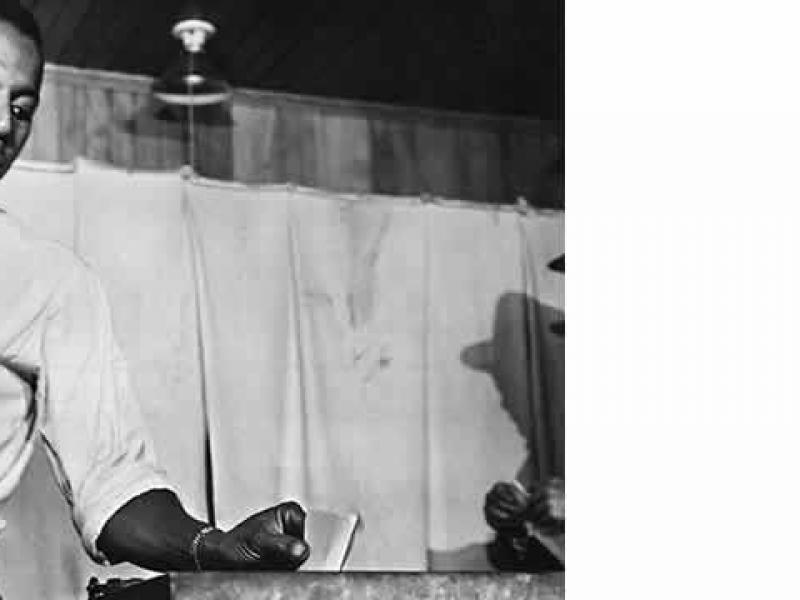The Voting Rights Act, the landmark civil rights legislation that provided federal oversight of voting in states where evidence of minority voter suppression existed, was passed on August 6, 1965. Nearly fifty years later, in 2013, the Supreme Court struck down key provisions at the heart of the law, stating that “our country has changed." Public opinion polling on voting rights over the last seventy-five years show a country united in a desire to see the right to vote protected, but divided in their beliefs about how to achieve that goal - or whether the goal has been reached already. From the Roper Center for Public Opinion Research archives:
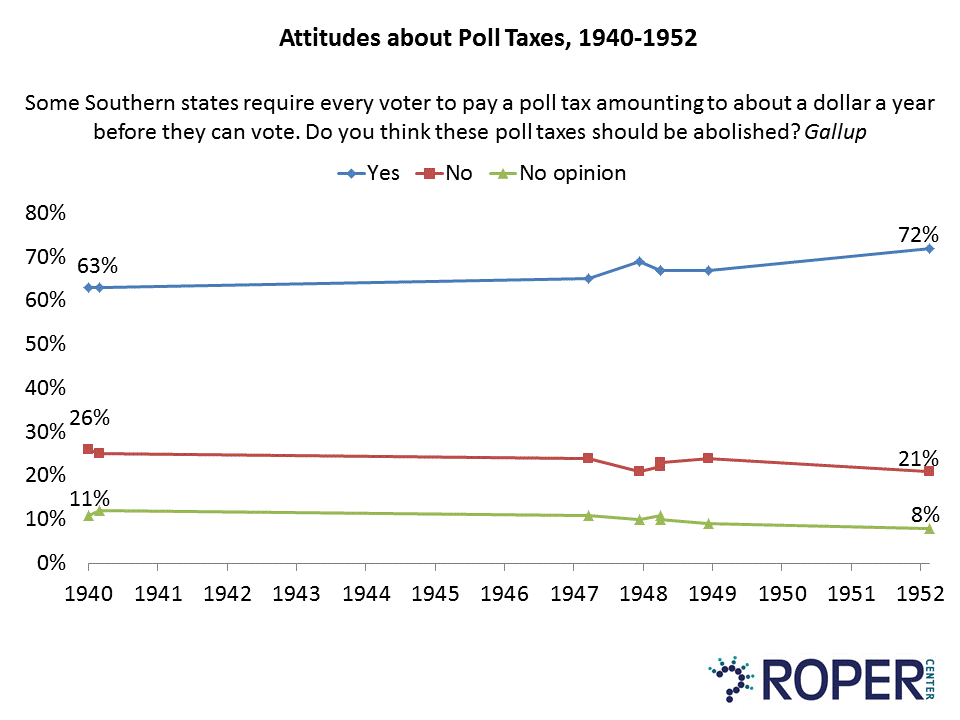 In the years immediately preceding the passage of the Voting Rights Act, Americans continued to show comparatively low support for action on voting rights when states' rights were invoked. Eight-six percent in 1964 approved a law to give “Negroes equal rights in voting", and 76% in a 1965 Gallup poll supported a potential new law in which the federal government would send officials into areas low turnout to “make sure Negroes and whites are given an equal opportunity to register and to vote." But only 53% favored the bill when given a question with the counter-argument that “opponents of the bill feel this is an invasion of the rights of states to control their own elections."
In the years immediately preceding the passage of the Voting Rights Act, Americans continued to show comparatively low support for action on voting rights when states' rights were invoked. Eight-six percent in 1964 approved a law to give “Negroes equal rights in voting", and 76% in a 1965 Gallup poll supported a potential new law in which the federal government would send officials into areas low turnout to “make sure Negroes and whites are given an equal opportunity to register and to vote." But only 53% favored the bill when given a question with the counter-argument that “opponents of the bill feel this is an invasion of the rights of states to control their own elections."
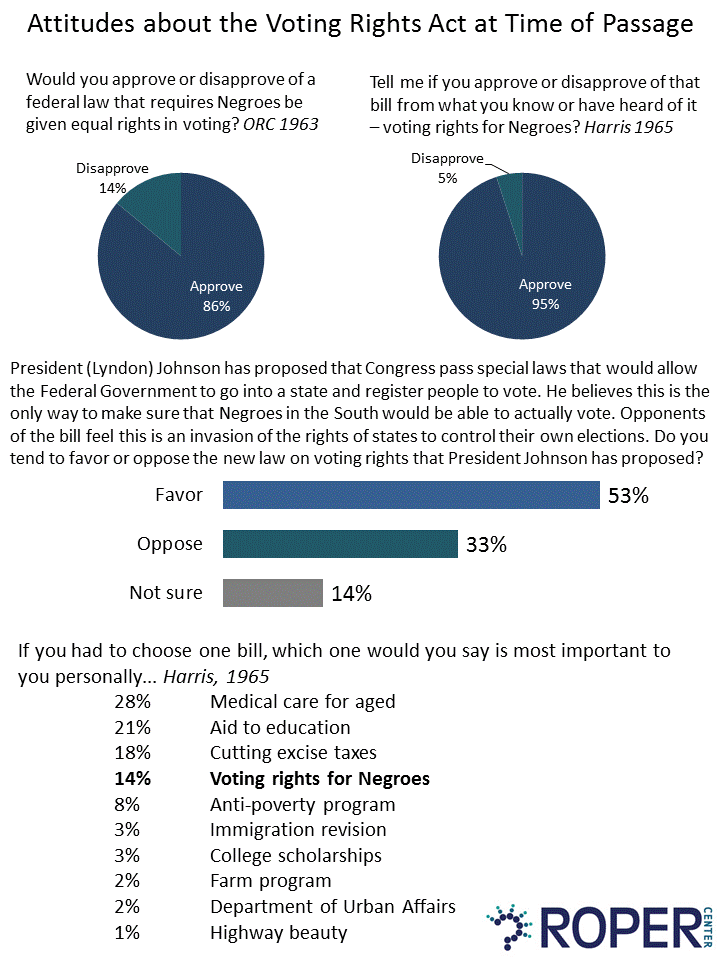 By the time the Voting Rights Act was passed in 1965, 95% said they approved of the bill. Approval does not imply personal salience. When asked what they considered that year's most important bill to them personally, only 14% of the country chose the Voting Rights Act, fewer than picked Medicare, aid to education, or cutting excise taxes. Just because most Americans did not see this particular piece of legislation as personally important to them, however, does not mean that they did not see the civil rights movement overall as a pressing issue for the nation. Throughout 1965, civil rights and Vietnam swapped off the top slot in Gallup's monthly open-ended question about the most important problem facing the country.
By the time the Voting Rights Act was passed in 1965, 95% said they approved of the bill. Approval does not imply personal salience. When asked what they considered that year's most important bill to them personally, only 14% of the country chose the Voting Rights Act, fewer than picked Medicare, aid to education, or cutting excise taxes. Just because most Americans did not see this particular piece of legislation as personally important to them, however, does not mean that they did not see the civil rights movement overall as a pressing issue for the nation. Throughout 1965, civil rights and Vietnam swapped off the top slot in Gallup's monthly open-ended question about the most important problem facing the country.
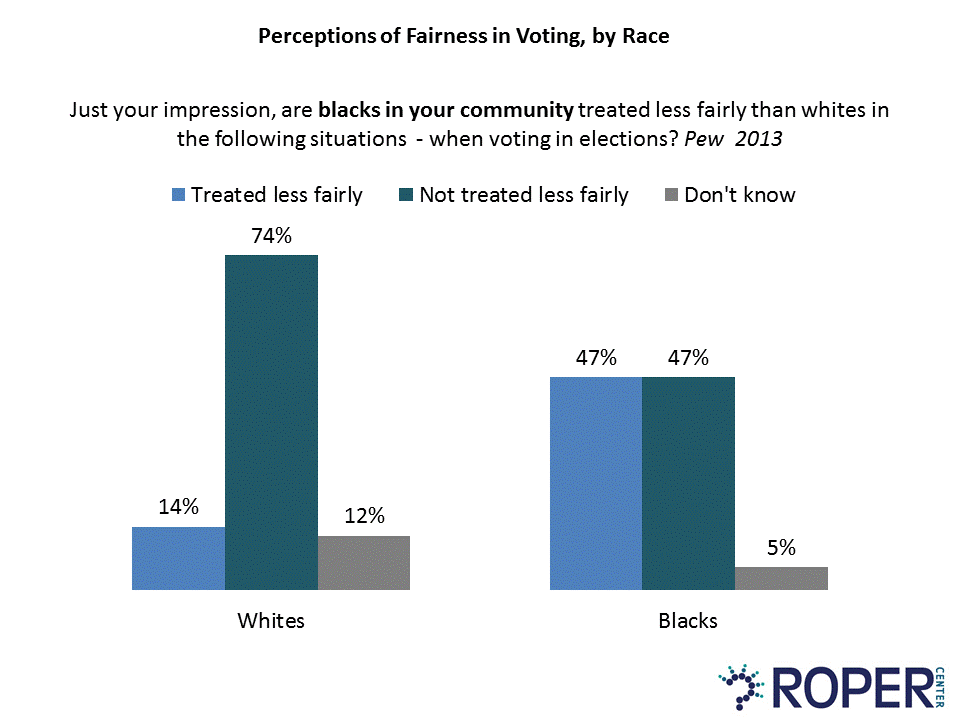 Given this difference, it is not surprising that blacks and whites also differ on whether the Voting Rights Act is still necessary today. While nearly all blacks and whites think the Voting Rights Act was needed in 1965, blacks are much more likely to say the law is still needed today (86%) than are whites (56%), although even among whites, a majority believe the Act remains necessary.
Given this difference, it is not surprising that blacks and whites also differ on whether the Voting Rights Act is still necessary today. While nearly all blacks and whites think the Voting Rights Act was needed in 1965, blacks are much more likely to say the law is still needed today (86%) than are whites (56%), although even among whites, a majority believe the Act remains necessary.
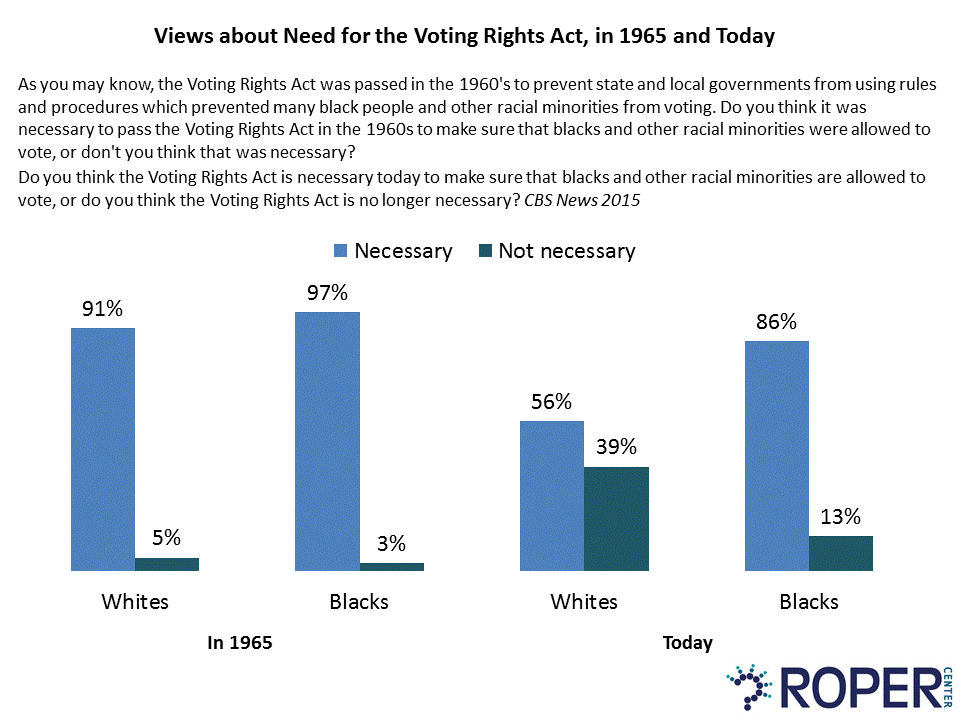 Attitudes about most policies to address voting access problems, however, are more similar across race lines. Blacks in 2013 were only slightly more supportive than whites of initiatives aimed at making voting easier, like same day registration.
The picture regarding voter identification laws in particular is a bit more complex. A 2013 poll found non-whites as supportive of voter ID laws as whites, but a 2015 CBS News poll found a difference in attitudes about voter ID laws; 83% of whites and 66% of blacks supported them. When a 2012 CBS News/NYT poll presented respondents with arguments for and against voter ID that mentioned the possibility of minority vote suppression, 53% of blacks supported such laws and 45% opposed, versus 74% of whites who supported and 24% opposed.
Attitudes about most policies to address voting access problems, however, are more similar across race lines. Blacks in 2013 were only slightly more supportive than whites of initiatives aimed at making voting easier, like same day registration.
The picture regarding voter identification laws in particular is a bit more complex. A 2013 poll found non-whites as supportive of voter ID laws as whites, but a 2015 CBS News poll found a difference in attitudes about voter ID laws; 83% of whites and 66% of blacks supported them. When a 2012 CBS News/NYT poll presented respondents with arguments for and against voter ID that mentioned the possibility of minority vote suppression, 53% of blacks supported such laws and 45% opposed, versus 74% of whites who supported and 24% opposed.
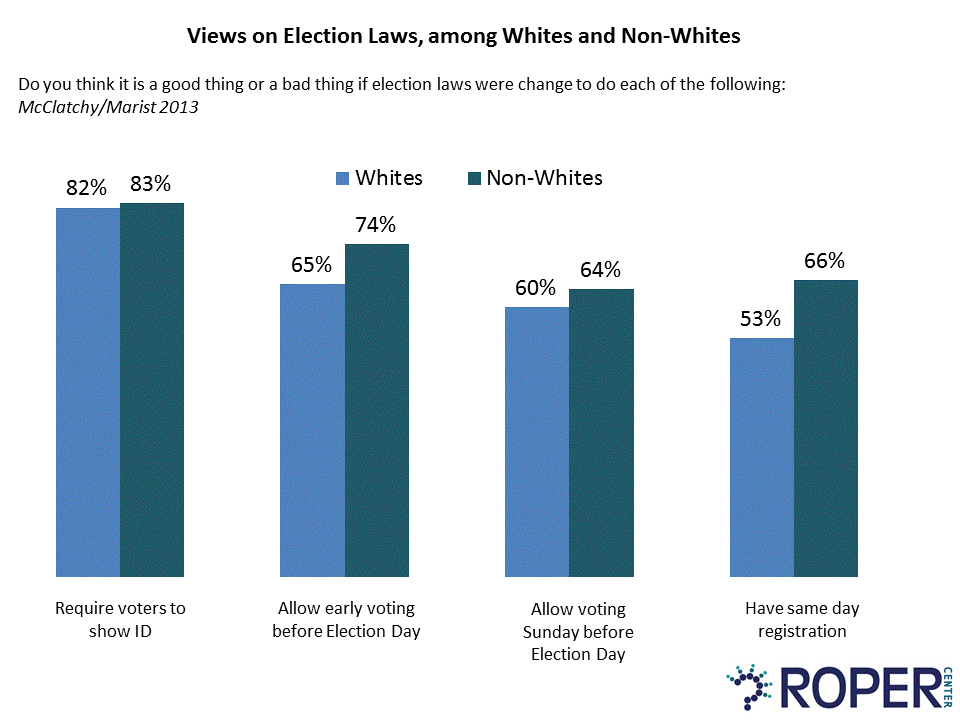 Blacks are more likely to see changes in voting laws as deliberate attempts at disenfranchisement. A July 2015 CBS News/NYT poll found that 46% of blacks, but only 20% of whites, thought shortening voting hours and reducing time for absentee and early voting was an attempt to make it harder for minorities to vote.
If such changes in election laws do threaten minority voting rights no longer vigorously supported by the Voting Rights Act after the Supreme Court decision, Congress could effect a solution that would address the Court's concerns. But on such action, yet again, the country is divided by race. In a 2013 McClatchy/Marist poll, just 22% of whites thought such action should be an immediate priority for Obama and Congress. Among blacks, who have far more at stake in this debate, 52% thought so. Two years later, on the fiftieth anniversary of the Voting Rights Act, no new law has been passed.
Blacks are more likely to see changes in voting laws as deliberate attempts at disenfranchisement. A July 2015 CBS News/NYT poll found that 46% of blacks, but only 20% of whites, thought shortening voting hours and reducing time for absentee and early voting was an attempt to make it harder for minorities to vote.
If such changes in election laws do threaten minority voting rights no longer vigorously supported by the Voting Rights Act after the Supreme Court decision, Congress could effect a solution that would address the Court's concerns. But on such action, yet again, the country is divided by race. In a 2013 McClatchy/Marist poll, just 22% of whites thought such action should be an immediate priority for Obama and Congress. Among blacks, who have far more at stake in this debate, 52% thought so. Two years later, on the fiftieth anniversary of the Voting Rights Act, no new law has been passed.
Poll taxes, states' rights, and the Voting Rights Act
The first questions asked about voting rights centered on the poll tax, an effective means of black voter suppression used in the South. In 1940, over six in ten Americans believed that the poll tax should be abolished. This number rose slightly over the following decade. However, despite majority disapproval of one of the major methods of voter suppression, the country was divided on using federal authority to change state-level laws. In a 1948 Roper/Fortune poll, 46% of the the country thought that “Congress should pass laws that will insure Negros the same chance to vote that white people have," and 49% thought each state should decide its own election rules. Similarly, nearly two decades later, 42% of Americans in a 1965 Harris poll thought that the poll tax as a requirement for voting should be outlawed by Congress, while 42% thought this should be left to the states, and 16% weren't sure. In the years immediately preceding the passage of the Voting Rights Act, Americans continued to show comparatively low support for action on voting rights when states' rights were invoked. Eight-six percent in 1964 approved a law to give “Negroes equal rights in voting", and 76% in a 1965 Gallup poll supported a potential new law in which the federal government would send officials into areas low turnout to “make sure Negroes and whites are given an equal opportunity to register and to vote." But only 53% favored the bill when given a question with the counter-argument that “opponents of the bill feel this is an invasion of the rights of states to control their own elections."
In the years immediately preceding the passage of the Voting Rights Act, Americans continued to show comparatively low support for action on voting rights when states' rights were invoked. Eight-six percent in 1964 approved a law to give “Negroes equal rights in voting", and 76% in a 1965 Gallup poll supported a potential new law in which the federal government would send officials into areas low turnout to “make sure Negroes and whites are given an equal opportunity to register and to vote." But only 53% favored the bill when given a question with the counter-argument that “opponents of the bill feel this is an invasion of the rights of states to control their own elections."
 By the time the Voting Rights Act was passed in 1965, 95% said they approved of the bill. Approval does not imply personal salience. When asked what they considered that year's most important bill to them personally, only 14% of the country chose the Voting Rights Act, fewer than picked Medicare, aid to education, or cutting excise taxes. Just because most Americans did not see this particular piece of legislation as personally important to them, however, does not mean that they did not see the civil rights movement overall as a pressing issue for the nation. Throughout 1965, civil rights and Vietnam swapped off the top slot in Gallup's monthly open-ended question about the most important problem facing the country.
By the time the Voting Rights Act was passed in 1965, 95% said they approved of the bill. Approval does not imply personal salience. When asked what they considered that year's most important bill to them personally, only 14% of the country chose the Voting Rights Act, fewer than picked Medicare, aid to education, or cutting excise taxes. Just because most Americans did not see this particular piece of legislation as personally important to them, however, does not mean that they did not see the civil rights movement overall as a pressing issue for the nation. Throughout 1965, civil rights and Vietnam swapped off the top slot in Gallup's monthly open-ended question about the most important problem facing the country.
After the Voting Rights Act
Polling about voting rights was rare in the decades following the passage of the Voting Rights Act. In 1978, a National Conference of Christians and Jews poll found that 49% of blacks thought that in five years they would be better off in terms of being able to register and vote, while 43% thought they would be about the same. Whites were a bit more optimistic; 63% thought blacks would be better off, and 33% thought the same. Very few blacks or whites thought blacks would be worse off. In a 1988 NAACP poll, 75% of all Americans said that blacks were about as well off as other groups of the same income and education with respect to voting rights, while only 10% thought they were less well off, and 12% thought they were better off. In the same poll, blacks showed high levels of support for a number of policies intend to protect voting rights and expand voter participation. Ninety-two percent of blacks said that it was important that voting districts be drawn so that blacks can obtain a representation in elective office comparable to their numbers in the population, and 81% said it was important that registration and voting be made easy, for example by having them both take place at one time on election day.Voting rights today: Differing perceptions
Blacks and whites differ in their perceptions of the current state of access to the vote. In a 2015 CBS News poll, only 21% of whites thought blacks were more likely to encounter problems in voting, but 57% of blacks thought so. Whites are also more likely to see blacks as being treated fairly in voting in their community. Given this difference, it is not surprising that blacks and whites also differ on whether the Voting Rights Act is still necessary today. While nearly all blacks and whites think the Voting Rights Act was needed in 1965, blacks are much more likely to say the law is still needed today (86%) than are whites (56%), although even among whites, a majority believe the Act remains necessary.
Given this difference, it is not surprising that blacks and whites also differ on whether the Voting Rights Act is still necessary today. While nearly all blacks and whites think the Voting Rights Act was needed in 1965, blacks are much more likely to say the law is still needed today (86%) than are whites (56%), although even among whites, a majority believe the Act remains necessary.
 Attitudes about most policies to address voting access problems, however, are more similar across race lines. Blacks in 2013 were only slightly more supportive than whites of initiatives aimed at making voting easier, like same day registration.
The picture regarding voter identification laws in particular is a bit more complex. A 2013 poll found non-whites as supportive of voter ID laws as whites, but a 2015 CBS News poll found a difference in attitudes about voter ID laws; 83% of whites and 66% of blacks supported them. When a 2012 CBS News/NYT poll presented respondents with arguments for and against voter ID that mentioned the possibility of minority vote suppression, 53% of blacks supported such laws and 45% opposed, versus 74% of whites who supported and 24% opposed.
Attitudes about most policies to address voting access problems, however, are more similar across race lines. Blacks in 2013 were only slightly more supportive than whites of initiatives aimed at making voting easier, like same day registration.
The picture regarding voter identification laws in particular is a bit more complex. A 2013 poll found non-whites as supportive of voter ID laws as whites, but a 2015 CBS News poll found a difference in attitudes about voter ID laws; 83% of whites and 66% of blacks supported them. When a 2012 CBS News/NYT poll presented respondents with arguments for and against voter ID that mentioned the possibility of minority vote suppression, 53% of blacks supported such laws and 45% opposed, versus 74% of whites who supported and 24% opposed.
 Blacks are more likely to see changes in voting laws as deliberate attempts at disenfranchisement. A July 2015 CBS News/NYT poll found that 46% of blacks, but only 20% of whites, thought shortening voting hours and reducing time for absentee and early voting was an attempt to make it harder for minorities to vote.
If such changes in election laws do threaten minority voting rights no longer vigorously supported by the Voting Rights Act after the Supreme Court decision, Congress could effect a solution that would address the Court's concerns. But on such action, yet again, the country is divided by race. In a 2013 McClatchy/Marist poll, just 22% of whites thought such action should be an immediate priority for Obama and Congress. Among blacks, who have far more at stake in this debate, 52% thought so. Two years later, on the fiftieth anniversary of the Voting Rights Act, no new law has been passed.
Blacks are more likely to see changes in voting laws as deliberate attempts at disenfranchisement. A July 2015 CBS News/NYT poll found that 46% of blacks, but only 20% of whites, thought shortening voting hours and reducing time for absentee and early voting was an attempt to make it harder for minorities to vote.
If such changes in election laws do threaten minority voting rights no longer vigorously supported by the Voting Rights Act after the Supreme Court decision, Congress could effect a solution that would address the Court's concerns. But on such action, yet again, the country is divided by race. In a 2013 McClatchy/Marist poll, just 22% of whites thought such action should be an immediate priority for Obama and Congress. Among blacks, who have far more at stake in this debate, 52% thought so. Two years later, on the fiftieth anniversary of the Voting Rights Act, no new law has been passed.
